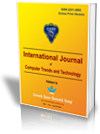A Survey on Host to Host Congestion Control
 | International Journal of Computer Trends and Technology (IJCTT) |  |
| © - June Issue 2013 by IJCTT Journal | ||
| Volume-4 Issue-6 | ||
| Year of Publication : 2013 | ||
| Authors :Mrs. P.Radhadevi , G. Anjaneyulu |

Mrs. P.Radhadevi , G. Anjaneyulu "A Survey on Host to Host Congestion Control"International Journal of Computer Trends and Technology (IJCTT),V4(6):1521-1526 June Issue 2013 .ISSN 2231-2803.www.ijcttjournal.org. Published by Seventh Sense Research Group.
Abstract: - Congestion has been considered as one of the basic important issue in packet switched network. Congestion control refers to the mechanisms and techniques to control the congestion and keep the load below the capacity. In data networking and queuing theory, network congestion occurs when a link or node is carrying so much data that its quality of service deteriorates. Typical effects include queuing delay, packet loss or the blocking of new connections. A consequence of these latter two is that incremental increases in offered load lead either only to small increase in network throughput, or to an actual reduction in network throughput. A survey of various congestion control proposals that preserve the original host-to-host idea of TCP-namely, that neither sender nor receiver relies on any explicit notification from the network. Many host-to-host techniques address several problems with different levels of reliability and precision. There have been enhancements allowing senders to detect fast packet losses and route changes. Other techniques have the ability to estimate the loss rate, the bottleneck buffer size, and level of congestion. The survey describes each congestion control alternative, its strengths and its weaknesses.
References-
[1]Alexander Afanasyev, Neil Tilley, Peter Reiher, and Leonard Kleinrock, “Host-to-Host Congestion Control for TCP”
[2] Sapna Gupta, Nitin Kumar Sharma, K.P. Yadav, “A Survey on Congestion Control & Avoidance”
[3] Van Jacobson, Michael J. Karels, “Congestion Avoidance and Control” TD-FR DOOR RR Eifel
[4] J. Widmer, R. Denda, and M. Mauve, “A survey on TCP-friendly congestion control,” IEEE Network, vol. 15, no. 3, pp. 28–37, May/June 2001.
[5] J. Postel, “RFC793—transmission control protocol,” RFC, 1981.
[6] S. Low, F. Paganini, and J.Doyle, “Internet congestion control”
Keywords — CSMA/CA, Queuing Theory, TCP Software
